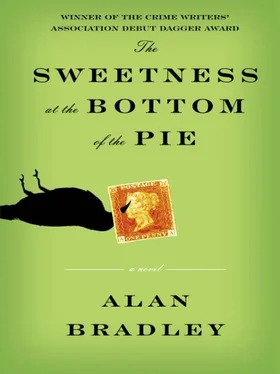Alan Bradley - The Sweetness at the Bottom of the Pie
Здесь есть возможность читать онлайн «Alan Bradley - The Sweetness at the Bottom of the Pie» весь текст электронной книги совершенно бесплатно (целиком полную версию без сокращений). В некоторых случаях можно слушать аудио, скачать через торрент в формате fb2 и присутствует краткое содержание. Жанр: Старинная литература, на английском языке. Описание произведения, (предисловие) а так же отзывы посетителей доступны на портале библиотеки ЛибКат.
- Название:The Sweetness at the Bottom of the Pie
- Автор:
- Жанр:
- Год:неизвестен
- ISBN:нет данных
- Рейтинг книги:3 / 5. Голосов: 1
-
Избранное:Добавить в избранное
- Отзывы:
-
Ваша оценка:
- 60
- 1
- 2
- 3
- 4
- 5
The Sweetness at the Bottom of the Pie: краткое содержание, описание и аннотация
Предлагаем к чтению аннотацию, описание, краткое содержание или предисловие (зависит от того, что написал сам автор книги «The Sweetness at the Bottom of the Pie»). Если вы не нашли необходимую информацию о книге — напишите в комментариях, мы постараемся отыскать её.
The Sweetness at the Bottom of the Pie — читать онлайн бесплатно полную книгу (весь текст) целиком
Ниже представлен текст книги, разбитый по страницам. Система сохранения места последней прочитанной страницы, позволяет с удобством читать онлайн бесплатно книгу «The Sweetness at the Bottom of the Pie», без необходимости каждый раз заново искать на чём Вы остановились. Поставьте закладку, и сможете в любой момент перейти на страницу, на которой закончили чтение.
Интервал:
Закладка:
"How Fate loves a jest," he went on in a half whisper. "Who said that? Cyrano de Bergerac, was it not?"
For just a fraction of a second, I thought how much Daffy would enjoy talking to this old gentleman. But only for a fraction of a second. And then I shrugged.
With a slightly amused smile, Dr. Kissing removed his cigarette from his mouth, and touched its lighted tip to the corner of the Ulster Avenger.
I felt as if a ball of fire had been thrown into my face; as if my chest had been bound with barbed wire. I blinked, and then, frozen with horror, watched as the stamp began to smolder, then burst into a tiny flame which licked slowly, inexorably, across Queen Victoria's youthful face.
As the flame reached his fingertips, Dr. Kissing opened his hand and let the dark ashes float to the floor. From beneath the hem of his dressing gown, a polished black shoe ventured out and stepped daintily on the remains then, with a few quick twists, ground them beneath the toe.
In three thunderous heartbeats, the Ulster Avenger was no more than a black smudge on the linoleum of Rook's End.
"The stamp in your pocket has just doubled in value," said Dr. Kissing. "Guard it well, Flavia. It is now the only one of its kind in the world."
22
WHENEVER I'M OUT-OF-DOORS AND FIND MYSELF wanting to have a first-rate think, I fling myself down on my back, throw my arms and legs out so that I look like an asterisk, and gaze at the sky. For the first little while, I'm usually entertained by my “floaters,” those wormy little strings of protein that swim to and fro across one's field of vision like dark little galaxies. When I'm not in a hurry, I stand on my head to stir them up, and then lie back to watch the show, as if it were an animated cinema film.
Today, though, I'd had too much on my mind to bother, so when I had bicycled no more than a mile from Rook's End, I threw myself down on the grassy bank and stared up into the summer sky.
I could not get out of my mind something that Father had told me, namely that the two of them, he and Horace Bonepenny, had killed Mr. Twining; that they were personally responsible for his death.
Had this been no more than one of Father's fantastic ideas I should have written it off at once, but there was more to it than that. Miss Mountjoy, too, believed they had killed her uncle, and had told me so.
It was easy enough to see that Father felt a real sense of guilt. After all, he had been part of the push to view Dr. Kissing's stamp collection, and his one time friendship with Bonepenny, even though it had cooled, made him an accomplice in a roundabout sort of way. But still…
No, there had to be more to it than that, but what it might be, I could not think.
I lay on the grass, staring up at the blue vault of Heaven as earnestly as those old pillar-squatting fakirs in India used to stare directly into the sun before we civilized them, but I could think of nothing properly. Directly above me, the sun was a great white zero, blazing down upon my empty head.
I visualized myself pulling on my mental thinking cap, jamming it down around my ears as I had taught myself to do. It was a tall, conical wizard's model, covered with chemical equations and formulae: a cornucopia of ideas.
Still nothing.
But wait! Yes! That was it! Father had done nothing. Nothing! He had known—or at least suspected—from the instant it happened that Bonepenny had pinched the Head's prize stamp… and yet he had told no one.
It was a sin of omission: one of those offenses from the ecclesiastical catalogue of crime Feely was always going on about that seemed to apply to everyone but her.
But Father's guilt was a moral thing and, as such, hardly my cup of tea.
Still, there was no denying it: Father had kept silent, and by his silence had perhaps made it seem necessary for the saintly old Mr. Twining to shoulder the blame and pay for the breach of honor with his life.
Surely there must have been some talk at the time. The natives in this part of England have never been known for their reticence; far from it. In the last century, the Hinley pond-poet Herbert Miles had referred to us as “that gaggle o' geese who gossip gaily 'pon the gladdening green,” and there was a certain amount of truth in his words. People love to talk—especially when the talking involves answering the questions of others—because it makes them feel wanted. In spite of the gravy-stained copy of Inquire Within Upon Everything which Mrs. Mullet kept on a shelf in the pantry, I had long ago discovered that the best way to obtain answers about anything was to walk up to the closest person and ask. Inquire without.
I could not very well question Father about his silence in those schoolboy days. Even if I dared, which I did not, he was shut up in a police cell and likely to stay there. I could not ask Miss Mountjoy, who had slammed a door in my face because she viewed me as the warm flesh and blood of a cold-blooded killer. In short, I was on my own.
All day, something had been playing away in the back of my mind like a gramophone in a distant room. If only I could tune in to the melody.
The odd feeling had begun when I was browsing through the stacks of newspapers in the Pit Shed behind the library. It was something someone said… but what?
Sometimes, trying to catch a fleeting thought can be like trying to catch a bird in the house. You stalk it, tiptoe towards it, make a grab… and the bird is gone, always just beyond your fingertips, its wings…
Yes! Its wings!
"He looked just like a falling angel," one of the Greyminster boys had said. Toby Lonsdale—I remembered his name now. What a peculiar thing for a boy to say about a plummeting schoolmaster! And Father had compared Mr. Twining, just before he jumped, to a haloed saint in an illuminated manuscript.
The problem was that I hadn't searched far enough in the archives. The Hinley Chronicle had stated quite clearly that police investigations into Mr. Twining's death, and the theft of Dr. Kissing's stamp, were continuing. And what about his obituary? That would have come later, of course, but what did it say?
In two shakes of a dead lamb's tail I was aboard Gladys, pedaling furiously for Bishop's Lacey and Cow Lane.
I DIDN'T SEE THE “CLOSED” SIGN until I was ten feet from the front door of the library. Of course! Flavia, sometimes you have tapioca for brains; Feely was right about that. Today was Tuesday. The library would not open again until ten o'clock on Thursday morning.
As I walked Gladys slowly towards the river and the Pit Shed, I thought about those sappy stories they tell on The Children's Hour: those moral little tales of instruction such as the one about the Pony Engine (“I think I can… I think I can…”) which was able to pull an entire freight train over the mountain just because it thought it could, it thought it could. And because it never gave up. Never giving up was the key.
The key? I had returned the Pit Shed's key to Miss Mountjoy: I remembered it perfectly. But was there by chance a duplicate? A spare key hidden under a windowsill to be used in the event some forgetful character wandered off on holiday to Blackpool with the original in her pocket? Since Bishop's Lacey was not (at least not until a few days ago) a notable hotbed of crime, a concealed key seemed a distinct possibility.
I ran my fingers along the lintel above the door, looked under the potted geraniums that lined the walkway, even lifted a couple of suspicious-looking stones.
Nothing.
I poked in the crevices of the stone wall that ran from the lane up to the door.
Still nothing. Not a sausage.
I cupped my hands to a window, and peered in at the stacks of crumbling newspapers sleeping in their cradles. So near and yet so far.
Читать дальшеИнтервал:
Закладка:
Похожие книги на «The Sweetness at the Bottom of the Pie»
Представляем Вашему вниманию похожие книги на «The Sweetness at the Bottom of the Pie» списком для выбора. Мы отобрали схожую по названию и смыслу литературу в надежде предоставить читателям больше вариантов отыскать новые, интересные, ещё непрочитанные произведения.
Обсуждение, отзывы о книге «The Sweetness at the Bottom of the Pie» и просто собственные мнения читателей. Оставьте ваши комментарии, напишите, что Вы думаете о произведении, его смысле или главных героях. Укажите что конкретно понравилось, а что нет, и почему Вы так считаете.












